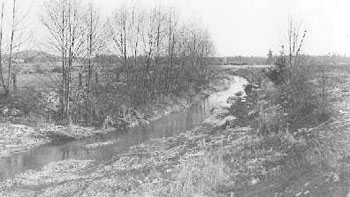Chinese Laborers Left Mark in County
Early Chinese immigrants to the Northwest made a dent in Clark County history. A couple of them, actually.
In the late 1800s, Chinese immigrants worked long, tedious hours to build two ditches. The town of LaCamas was a hot spot because of the timber industry. The increase in demand for timber products fueled the need for a ditch, to be built by 30 laborers, that would link Lacamas Lake and the Lacamas paper mill (currently the Camas paper mill) and supply water for electric power in 1884.
More than 100 Chinese were also hired in 1893 to dig the Eureka Ditch, which would drain a swampy agricultural area in east Clark County. It later became known as “China Ditch” and ran alongside what is now 172nd Avenue.
The method used to dig the ditches was different. Chinese laborers would fill wicker baskets with dirt and pass them along a human chain to the top of the ditch, according to Robin Turner, who wrote an account of Chinese immigrants in Clark County for the book “Clark County History 1997.” The ditch was sloped, with terraces where workers stood while passing the baskets to the top.
They sang songs that reminded them of their homeland, Turner wrote, working to the rhythm to help pass the time.
Taxpayers objected to the China Ditch because its boundaries edged in on Mud Creek. They took the matter to court. Despite white harassment, the Chinese refused to quit their jobs until completing the contract, wrote Columbian reporter Charles A. Gauld in a 1975 account of the role Chinese played in early Clark County history.
The State Drainage Act was declared unconstitutional in May 1894, according to Fort Vancouver Historical Society records. On June 2, 1894, the Chinese workers left the project. Because China Ditch was almost finished, the government later allowed it to be completed.
Chinese immigrants were skilled in many trades and were willing to work long hours and provide the physical labor that helped Clark County grow and prosper.
After first immigrating to the Vancouver-Portland area, they worked jobs in mining, digging, cooking, cleaning, factories, cutting wood, raising crops and laying railroad ties, often at the expense of raising a family. Those who could afford it returned to their homeland to marry before returning to their jobs in Pacific Coast cities, Gauld wrote.
Sadly, many Chinese immigrants never saved enough money to return to China and often died in the area they worked. Many were buried in a Chinese cemetery on Portland’s east side.
